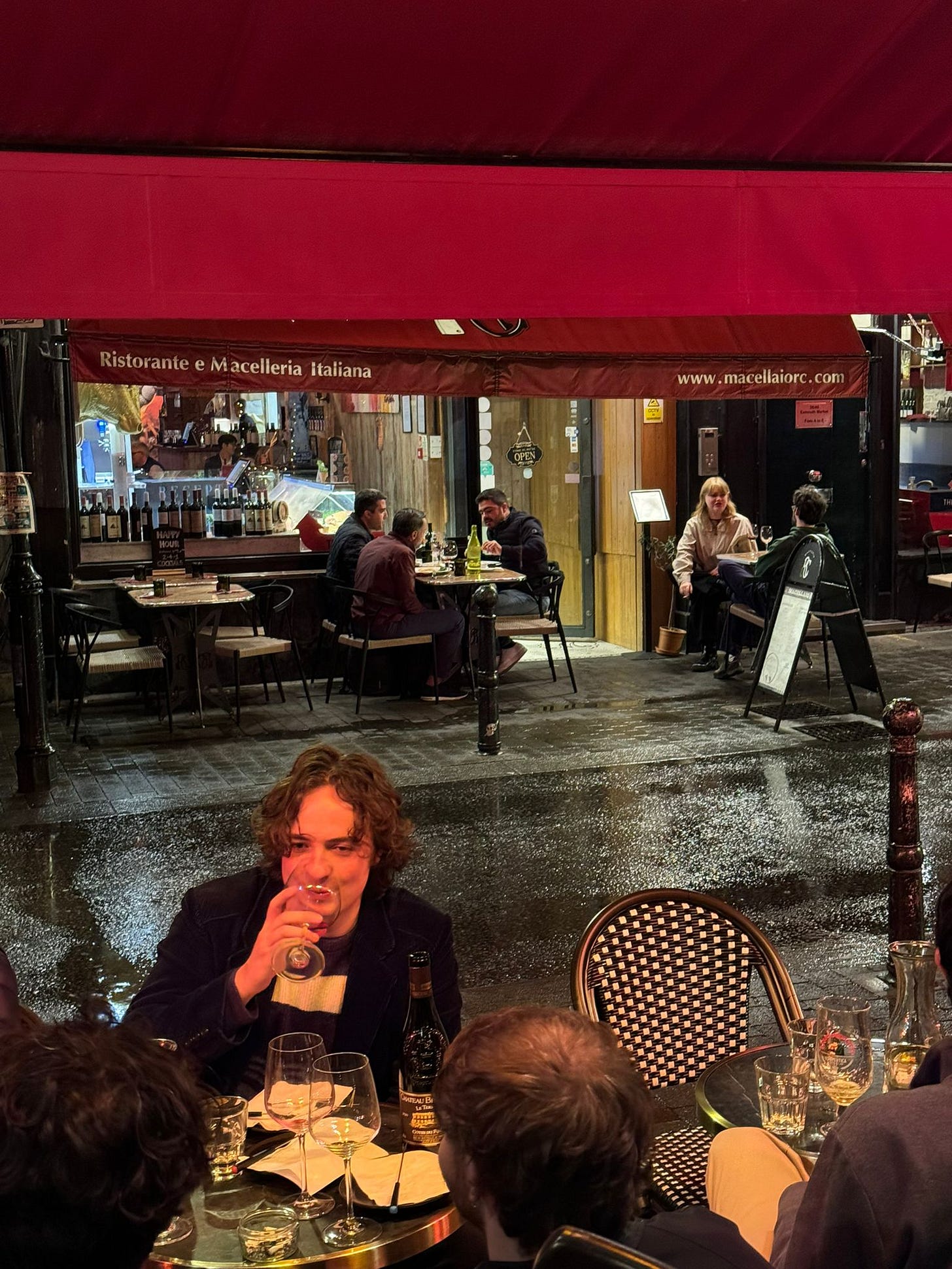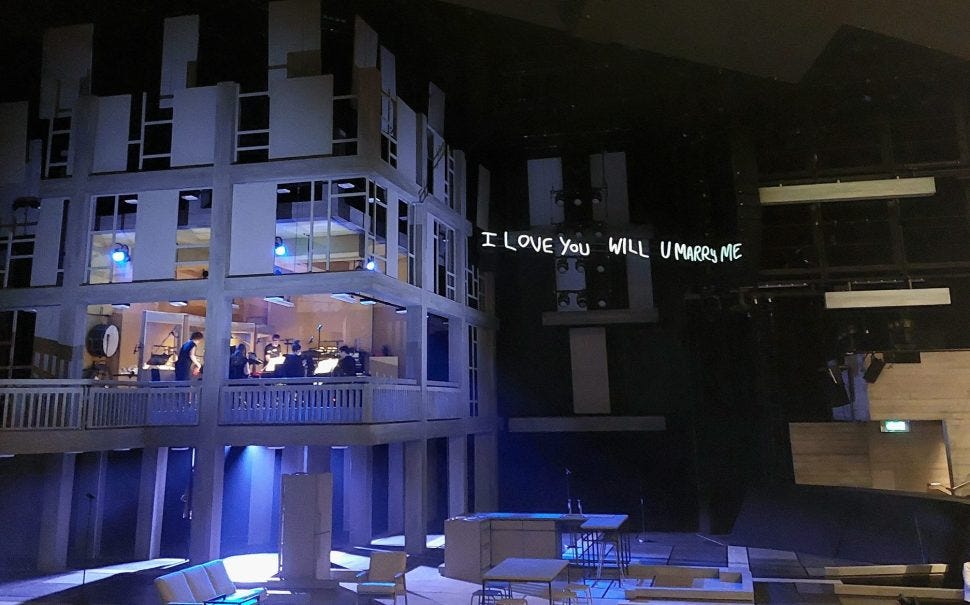Here is young David Copperfield first seeing the theatre:
To have all those noble Romans alive before me, and walking in and out for my entertainment, instead of being the stern taskmasters they had been at school, was a most novel and delightful effect. But the mingled reality and mystery of the whole show, the influence upon me of the poetry, the lights, the music, the company, the smooth stupendous changes of glittering and brilliant scenery, were so dazzling, and opened up such illimitable regions of delight, that when I came out into the rainy street, at twelve o’clock at night, I felt as if I had come from the clouds, where I had been leading a romantic life for ages.
The Mousetrap near Leicester Square has been running since March 1974. The accents are hopeless, the staging is naff and it’s all so cheesy, but it is just what you want from a whodunnit! Indeed the title has new aptness: the play is a piece of cheese that, despite more elevated judgement, is irresistible! And even though it has been running for so long – the longest continuous run of any show on Earth! – the cast still comes out at the end to ask that you don’t spoil the mystery to others. “Keep the secret of whodunnit,” the revealed murderer steps forth and requests, “locked in your heart.”
Standing At The Sky’s Edge played at the Gillian Lynne Theatre in Covent Garden this year. It is about three families occupying a single flat at three different times. The flat is in Sheffield’s famous Park Hill Estate. A high walkway between two buildings there has the graffiti a man once scrawled for someone he loved: “I love you will u marry me”. A recreation glows above you throughout the show. Apparently in person it can be seen in the sky all around the city. I will certainly go to Sheffield to see it. For now I keep a badge of it on my desk.
Once I had a fleat in Battersea and had a friend in King’s Cross. It was one of the happiest arranements London has yet contrived for me, because if I timed an evening visit correctly the Hamilton audience would issue into my carriage at Victoria. ‘Why did Burr shoot him?’ ‘Oh my god!’ they said. They were freshly caught up in the insatiability that play lends, and I would get caught up in it with them.
It is wonderful to think that each night all these theatres expel a few thousand people feeling the unique feeling each play creates, and that all these people then got on the tube or into taxis and go home to wherever home is, and wake up the next day and go wherever they go, across the city and country and planet, and bring a bit of the play’s feeling with them to the places and people they go to. They flow out and characterise Earth. A play is like a trusty fountain of a feeling.
Nor is it only theatres. AA Gill describes one kitchen’s fumes joining with those of all London’s others: “The long steel chimney … sucks the fumes … spews, exhales, up, up, up and out, into the exhausted sky, to mix with all those other heavenly burnt offerings of London at the trough.” Restaurants, cinemas, buildings, exhibitions, concerts, night clubs!
But those happy moments on the Hamilton tube were sad too. Seeing the mood fresh in others made you realise it had faded in you. You were so invigorated when you left Hamilton, but you didn’t stay like that. There is some comfort in Ralph Waldo Emerson’s quote: “I cannot remember the books I've read any more than the meals I have eaten; even so, they have made me.” Still the crowd’s freshness hurts you. If something is best, you want it forever. Why can’t you always feel like you’ve just watched Hamilton?
There's some instinct to use nothing you know will run out. In Minecraft you can get powers, say fire resistence, from either potions or beacons. Crafting potions expends ingredients and their effect lasts only three minutes. Beacons provide a constant effect within their radius. But you cannot access them until much later in the game and they only work in their radius. I would have no effects until I could afford a beacon, and then wouldn’t leave its radius.
Instead you depend on the permanent. Someone might never take holiday, unable to enjoy leaving home life until home life feels more complete. The manifestations of this inside relationships you have probably seen. A friend was tortured by whether or not to open the window at nights. She felt she needed a rule that would answer the question for every future night. She panicked and was paralysed if she wanted to change the window but did not know what rule the change would be following.
The longing for permanence is natural, but ought to be reconciled. Sam Cooke’s performance of two songs in 1963 – here and below – is, I think, the most romantic object ever, but it hopes for impossible eternities, unrealistic infinities. “Please give your loving heart to me / And say we'll never part / I think of you every morning / Dream of you every night.” Dreaming of the same thing every night is like finding a permanent rule about opening the window, and you can’t know you’ll never part.
Maybe Guns N Roses’s November Rain, which some men once got me to sway to in Cambridge, has it better. At first it notes sadly: “Nothing lasts forever / And we both know hearts can change / And it's hard to hold a candle / In the cold November rain”. But at the end it changes: “So never mind the darkness, we still can find a way / Cause nothing lasts forever, even cold November rain”. Still nothing lasts forever, but it’s different.
I was surprised and gladdened to read about a famous old actor who chose the stage because it doesn’t last. He rejected film because it was not transient. To him the ephemerality of theatre was a merit. That performance dies and must be revived each night (“Announce each day the performance!”) was truer to life and more human.
In David Copperfield, which we started with, the highest virtue is heart. All the kind souls – Mr Peggoty, Ham, Mr Dick, Traddles, Copperfield, Mowcher, and of course Betsey Trotwood, whose namesake pub on the Farringdon Road we like to drink in – are described as hearty.
Mr Omer becomes wheelchair bound. Nonetheless Copperfield finds him “indescribably enjoying” his life. His limbs don’t work and he can’t breathe, but he points out that he has his family to wheel him around and his eyes and ears to see and hear things with. “With the exception of my limbs and my breath, howsoever,” he says, “I am as hearty as a man can be, I'm thankful to say.”
Miss Crupp cheers up Copperfield (and the ‘cour’ in ‘encourage’ is Latin’s ‘cor’: ‘heart’): “'Oh, bless you! Keep a good heart, sir!' said Mrs. Crupp, nodding encouragement. 'Never say die, sir!’”
When we must say die, it’s a great thing if we can also say, as is said of Ham on his death: “his generous heart was stilled for ever.”
Maybe rather than as fountains we can imagine those theatres, all across London, as hearts. A beat sends out blood cells fresh with new oxygen. The oxygen is used and dissipates, and we cannot preserve it, but that’s not sad. The heart beats again. One day it does not – and Standing At The Sky’s Edge is already closed – but we know that is a very bad reason to make no use of today’s oxygen.
This week brings us to 10,000 words of Peaceable Land. Thanks so much for reading and for all the extremely kind words you have sent me throughout. I feel really lucky. You have really – ready? – encouraged me!
I am heartened and I hope you are heartened too.
Heartily yours,
GM
Afterbirth
I am pleased with my short review of William Boyd’s new book. I say “sexy lady”. It’s page 85 if you buy the magazine, which is a special large issue this week for the Labour Conference.
Here’s that Sam Cooke performance:






